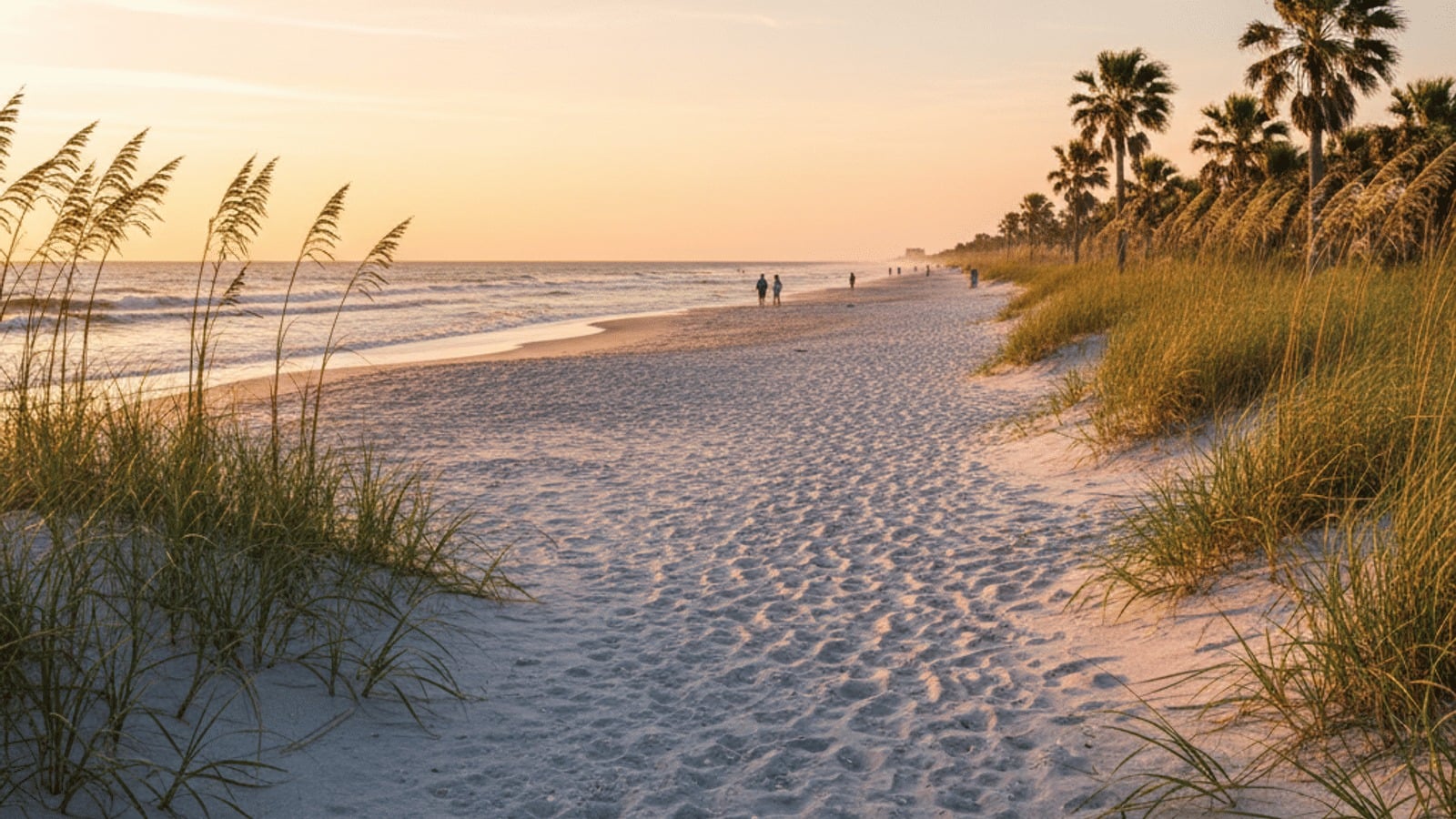If you are thinking about moving to Northeast Florida, the first thing you need to wrap your head around is the sheer scale of Jacksonville. This isn't just a beach town, and it’s not a compact urban center like Boston or San Francisco. It is the largest city by land area in the contiguous United States, sprawling over 840 square miles.
Because of that size, life here is defined by "pockets." We have a unique identity that locals often call the "First Coast," where a Southern cultural vibe meets a laid-back coastal atmosphere. You can live a boat-centric life on the St. Johns River, a surf-centric life at the beach, or a walkable urban lifestyle in a historic district—and they all feel like different worlds. With the job market ranking as one of the hottest in the country for 2026, we are seeing more relocations than ever. If you are looking through a moving to florida guide or weighing your options, getting the lay of the land early is the best way to start.
Pros and Cons of Living in Jacksonville
Living here comes with some distinct advantages, especially regarding your bank account, but it requires some lifestyle adjustments if you are coming from a dense northern city.
The Pros: Financially, Jacksonville is hard to beat. We generally have a lower cost of living than Miami, Tampa, or Orlando, and like the rest of the state, we benefit from zero state income tax. Beyond the finances, the outdoor life is incredible. We have the largest urban park system in the U.S. (the Timucuan Ecological and Historic Preserve is a gem), and our beaches are wide, public, and generally less crowded than South Florida's. The job market is also robust, particularly in fintech, healthcare, and logistics.
The Cons: The biggest adjustment for newcomers is almost always the car dependency. Because of the sprawl, public transportation is limited and simply not feasible for most daily commutes. You will need a car, and you will spend time in it. Additionally, while the winters are mild, the summers are genuinely hot and humid, and bug control is just a part of monthly maintenance here. Finally, the insurance market volatility that has affected the entire state is very real here; securing coverage requires due diligence.
Cost of Living & Housing Market (2026 Update)
If you were watching the market a few years ago, you might remember the bidding wars. Fortunately, things have shifted. As of early 2026, we have moved much closer to a "buyer's market." Inventory has increased, giving buyers more leverage than they’ve had in years.
Housing and Rent: After the highs of previous years, the median home price has stabilized in the $390,000 to $415,000 range. That is still significantly more affordable than comparable coastal cities. If you aren't ready to buy, the average rent is hovering around $1,640 per month. While that’s up from historic lows, it is still a relief compared to the $2,500+ averages seen in South Florida hubs.
The Insurance "Wild Card": This is the conversation you need to have with your agent immediately. Cost of living in Florida isn't just about the mortgage; it's about the insurance premium. Rates vary wildly based on the age of the roof and the flood zone. Homes with newer roofs and passed wind mitigation inspections are gold here.
Taxes and Utilities: Florida property taxes can be tricky for year-one residents, but once you establish residency, the Homestead Exemption helps cap future increases. As for utilities, gas and electric hover near the national average, though you should budget for a spike in electricity bills from May through October when the AC is running non-stop.
Best Neighborhoods in Jacksonville
Because the city is so massive, choosing the right neighborhood dictates your entire experience. You usually have to pick two out of three: close to work, close to the beach, or more house for your money.
The Beaches: If you want the salt life, look at Jacksonville Beach, Neptune Beach, and Atlantic Beach. This area has a distinct, laid-back surf culture. It is pricier than the mainland, but you are paying for the ability to bike to the ocean. Neptune and Atlantic Beach have a very tight-knit, village feel with great local dining, while Jax Beach offers a bit more nightlife and energy.
Historic & Urban Core: If you love walkability, architecture, and independent coffee shops, you want to look at Riverside, Avondale, or San Marco. These neighborhoods sit along the St. Johns River and feature historic homes (bungalows to mansions) with moss-draped oaks. Riverside and Avondale are known for their artsy vibe and parks, while San Marco has a slightly more polished, village-square feel. Pricing here often reflects a premium for the charm and location.
Suburbs & Master-Planned Communities: For those seeking newer construction, resort-style amenities, and designated golf cart paths, the suburbs are booming.
- Nocatee: Consistently one of the top-selling master-planned communities in the U.S., located in Ponte Vedra. It’s famous for its water parks, town center, and community events. A nocatee neighborhood guide will show you it’s practically its own town.
- Mandarin: Located south of downtown, this area is known for beautiful river views, massive oak trees, and a quieter, established residential feel.
- Bartram Park: A newer growth area with easy access to the interstate, offering townhomes and modern single-family options.
Job Market & Major Employers
Jacksonville’s economy is incredibly diverse, which helped it earn the ranking of the #2 hottest job market by the WSJ recently. We aren't reliant on just tourism, which provides a lot of economic stability.
Key Industries: Healthcare is a massive employer here, anchored by the world-renowned Mayo Clinic and the expansive Baptist Health system. We are also a quiet giant in the finance world—companies like FIS, Fidelity, and Deutsche Bank have major operations here. Logistics is another pillar; thanks to JAXPORT and the intersection of I-95 and I-10, companies like Amazon and CSX have a huge footprint.
Military and Tech: We are a proud Navy town. Naval Air Station Jacksonville and Naval Station Mayport bring thousands of service members and contractors to the area, creating a consistent economic foundation. Meanwhile, the remote work and tech scene is growing, with more co-working spaces popping up in the Urban Core for digital nomads.
Lifestyle: Weather, Outdoors, and Recreation
Life here revolves around the water, but it’s a 50/50 split between the ocean and the river. You’ll see just as many people boating, fishing, or kayaking on the St. Johns River as you will surfing at the coast.
Parks and Sports: If you love green space, you’ll love the Timucuan Ecological and Historic Preserve—it’s 46,000 acres of unspoiled wetlands and trails. For sports fans, the energy is undeniable. We love our Jacksonville Jaguars (NFL), and game days are massive events. For a more relaxed vibe, catching a Jumbo Shrimp baseball game downtown is a local favorite tradition.
The Climate Reality: We enjoy mild winters where you rarely need a heavy coat. However, from June to November, it is hurricane season. While Jacksonville has historically been lucky regarding direct hits compared to the Gulf Coast, tropical storms and flooding are real risks. Checking flood zones before renting or buying is mandatory.
Schools and Education
When looking at education, locals often differentiate between the two main counties: Duval and St. Johns.
County Differences: St. Johns County, located just south of the Duval county line (where Nocatee and Ponte Vedra are), is famous for having some of the highest-rated public school districts in the state. This reputation drives a lot of real estate demand in that area.
Duval County Options: Duval County serves the main city of Jacksonville and operates a massive system with extensive magnet programs. These magnets allow students to focus on specialized areas like the arts, aviation, or STEM, providing excellent alternatives to neighborhood schools.
Higher Education: For higher learning, the University of North Florida (UNF) is a major hub, alongside Jacksonville University (JU) and Florida State College at Jacksonville (FSCJ), providing a steady stream of graduates into the local workforce.
Comparison: Jacksonville vs. Tampa, Orlando, and Miami
If you are looking at a Florida City comparison, here is how Jacksonville stacks up against the other big metros.
- Vs. Tampa: Jacksonville is generally more affordable and has less traffic congestion than Tampa. However, Tampa offers a more developed bay/downtown loop and a slightly more "tropical" feel.
- Vs. Orlando: We have the beach; they have the theme parks. Orlando has heavier tourist traffic and feels more transient. Jacksonville feels more like a settled residential city.
- Vs. Miami: It’s night and day. Jacksonville is significantly cheaper—homes can easily be $150k to $200k less for comparable square footage. The pace here is much slower, "Southern," and less international than Miami.
Frequently Asked Questions
Is Jacksonville, FL a good place to live?
Yes, for most people it offers a great balance of affordability and lifestyle. It provides the benefits of a coastal Florida lifestyle—beaches, parks, and no state income tax—without the extreme costs or congestion found in Miami or other major metros.
What is the cost of living in Jacksonville in 2026?
The cost of living remains lower than the Florida average. As of early 2026, the median home price has stabilized around $390,000–$415,000, and rents average $1,640, making it one of the more attainable large cities in the state.
Does Jacksonville get hurricanes?
Yes, Jacksonville is in a hurricane zone, though direct hits have historically been rarer here than in South Florida. However, tropical storms often bring storm surge and heavy rain, so understanding flood zones and having proper insurance is critical.
What is the best area to live in Jacksonville?
There is no single "best" area because the city is so spread out; it depends entirely on your lifestyle. If you want walkability and cafes, choose Riverside or San Marco; if you want ocean access, choose the Beaches; if you want amenities and new construction, look at Nocatee or the Southside suburbs.
How far is the beach from downtown Jacksonville?
Many newcomers are surprised to find that the beach is not right next to the skyline. It is typically a 20 to 30-minute drive from Downtown Jacksonville to the ocean, depending on traffic and your starting point.



